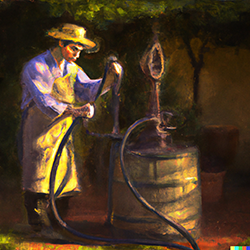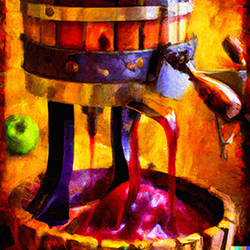How You Should, and Should Not Clean Your Wine Press.
Posted by Matteo Lahm on 22nd Dec 2022
Deep in the heart of every wine lover, there is a hidden desire to make your own vintage entirely from scratch. For many, making wine means more than just getting drunk. It’s a labor of love that requires patience, skill and proper technique. And when it comes time to clean up once you are done pressing your wine, your trusty wine press needs ritualistic and diligent care.
The humble wood wine press is essential for any home winemaker working with fresh grapes. But while they are incredibly dependable tools, they require regular cleaning and maintenance if they are going to last. For those who know better, just spraying down your press with your garden hose is a no-no. It is not nearly sufficient to get the job done so if you are using this method, stop. You are asking for trouble. Yeast, mold and bacteria are incredibly resilient and if your wood is not properly cleaned and sanitized, those unwanted guests just might decide to have a party in your wine bottles leaving you to feel like Carrie at the prom when you take your first sip.

So how do you go about properly cleaning and sanitizing your prized press? Let’s start with the wood components. The first step is to wash them with warm water and either Easy Clean or One Step. These cleaners are specially formulated for winemaking equipment and will help remove all debris which could become lodged within the pressing components during use. Use new sponges and brushes to get into all those nooks and crannies to remove all remnants of previous use. Once you are done, you can then bust out the garden hose and give it a thorough spraying.
Now that your wood components have been cleaned, it is time to sanitize. Mix 2-3 tablespoons of Sulfites per gallon of water or 2 ounces of Star San per 4 gallons of water and soak your cage, blocks and plates. A large plastic tote, a clean garbage can or barrel big will fit smaller cages that do not open. Larger cages can be easily disassembled to fit smaller containers. Don’t be afraid to let them soak for a while as neither Star San nor sulfites will not damage your materials. Since wood is porous, you really want the sanitizing solution to penetrate the material to kill off yeast, bacteria and reduce wine stains in the wood. Once you’re done, remove your wood parts from the sulfite solution and do not rinse.
For cleaning your base, it is a lot simpler. Use Easy Clean or One Step to scrub it clean. Bust out the garden hose again to thoroughly rinse. To sanitize, put your sulfite or Star San solution into a spray bottle. Coat it generously and do no rinse.
After you are finished, let everything dry completely. If it is a nice day, put your wine press in the sun. Once dried, store it in a cool dry place far from any petroleum products, cleaning solutions or paints. You might also want to store your cage and wood in plastic bags. It is advisable to poke some holes in the bag or just close them loosely so any moisture can escape. This will help you avoid mold.

Now for what you should not do. Contrary to the assertions of some, do not use bleach on your press, ever. For all the same reasons you want to leave your wood components in a sulfite or Star San solution, you would never want to do this with beach. Bleach leaves behind residues and smells that you do not want anywhere near your wine. It is also corrosive and can damage delicate parts like rubber seals and metals. Lastly, bleach is not food safe. It should only be used to wash your floors, your laundry and maybe unclog your drains but never to clean your wine press.
You should also avoid using regular dish soap or any cleaners not specifically designed for winemaking equipment. Any other soaps or cleaners will absorb into the wood. This will taint your wine and when you taste the fruits of your labor, dish soap or Simple Green are not on the list of favorable characteristics for your Cabernet Sauvignon, Pinot Noir or Chardonnay.
Lastly there are some other antiquated techniques that have survived either by legend or bad habit. Some choose to rinse the equipment using vodka or white spirits after soaking in order kill off bacteria. This can be expensive, and it is entirely unnecessary. Sulfites or Star San will perfectly do the job and, vodka will also leave behind residues and smells you don’t want. If you have ever tasted wine aged in a whiskey barrel, you know why you should avoid this practice.
A wine press is a long-term investment and caring for it doesn't need to be complicated or overly arduous. A little TLC and regular maintenance should help you keep your wine press going strong right through every season!

